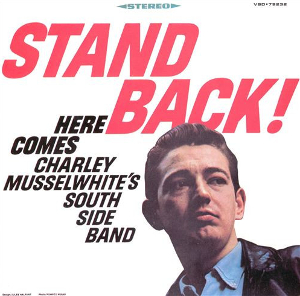Stand Back! Here Comes Charley Musselwhite's Southside Band
| Stand Back! Here Comes Charley Musselwhite's Southside Band | ||||
|---|---|---|---|---|
 |
||||
| Studio album by Charlie Musselwhite's Southside Band | ||||
| Released | 1966 or 1967 | |||
| Genre | Chicago blues | |||
| Length | 45:48 | |||
| Label | Vanguard | |||
| Producer | Samuel Charters, Barry Goldberg | |||
| Charlie Musselwhite's Southside Band chronology | ||||
|
||||
| Professional ratings | |
|---|---|
| Review scores | |
| Source | Rating |
| Allmusic | |
Stand Back! Here Comes Charley Musselwhite's Southside Band is the 1966 or 1967 debut album of American blues-harp musician Charlie Musselwhite, leading Charlie Musselwhite's Southside Band. The Vanguard Records release brought Musselwhite to notability among blues musicians and also helped bridge the gap between blues and rock and roll, musically and in marketing. With rough vocals and notable performances on harmonica, guitar and bass guitar, the album was critically well received. It introduced Musselwhite's signature song, his cover of Duke Pearson's "Cristo Redemptor".
The album has been critically well-received, described as "legendary", "seminal", and "one of the classic blues albums of the decade." Its success established Musselwhite in the field of blues music, but it also had an impact on rock and roll. The Southside Band, named for Chicago's South Side, was a combination of blues rhythm section—with Fred Below and Bob Anderson—and rock-influenced musicians Barry Goldberg and Harvey Mandel. Among the first blues albums targeted also to fans of rock and roll, it was influential in bridging the gap between blues and rock. The album's success allowed Musselwhite to launch a career as a full-time musician, relocating from Chicago to California, and also secured his reputation as a harmonica player whose collaborations have included Muddy Waters, Howlin' Wolf, Tom Waits, Ben Harper and INXS. The album is among Musselwhite's most successful.
...
Wikipedia
